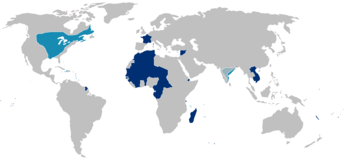
Back Franse koloniale ryk Afrikaans الإمبراطورية الاستعمارية الفرنسية Arabic Imperiu colonial francés AST Fransa müstəmləkə imperiyası Azerbaijani فرانسه سؤمورگه ایمپراتورلوغو AZB Француз колониаль империяһы Bashkir Калоніі Францыі Byelorussian Френска колониална империя Bulgarian ফরাসি ঔপনিবেশিক সাম্রাজ্য Bengali/Bangla Impalaeriezh trevadennel Frañs Breton
French colonial empire Empire colonial français (French) | |||||||||||
|---|---|---|---|---|---|---|---|---|---|---|---|
| 1534–1980[1][2] | |||||||||||
|
Left: Royal Standard of France (before 1792) Right: Flag of the French Empire and the French Republic | |||||||||||
 The First (light blue) and Second (dark blue) French colonial empires | |||||||||||
| Status | Colonial empire | ||||||||||
| Capital | Paris | ||||||||||
| Religion | Catholicism, Islam, Judaism,[3] Louisiana Voodoo,[4] Haitian Vodou,[5] Buddhism,[6] Hinduism[7] | ||||||||||
| History | |||||||||||
| 1534 | |||||||||||
| 1803 | |||||||||||
| 1830–1903 | |||||||||||
| 1946 | |||||||||||
| 1958 | |||||||||||
• Independence of Vanuatu | 1980[1][2] | ||||||||||
| Currency | French franc and various other currencies | ||||||||||
| ISO 3166 code | FR | ||||||||||
| |||||||||||
The French colonial empire (French: Empire colonial français) comprised the overseas colonies, protectorates, and mandate territories that came under French rule from the 16th century onward. A distinction is generally made between the "First French colonial empire", that existed until 1814, by which time most of it had been lost or sold, and the "Second French colonial empire", which began with the conquest of Algiers in 1830. On the eve of World War I, France's colonial empire was the second-largest in the world after the British Empire.
France began to establish colonies in the Americas, the Caribbean, and India in the 16th century but lost most of its possessions after its defeat in the Seven Years' War. The North American possessions were lost to Britain and Spain, but Spain later returned Louisiana to France in 1800. The territory was then sold to the United States in 1803. France rebuilt a new empire mostly after 1850, concentrating chiefly in Africa as well as Indochina and the South Pacific. As it developed, the new French empire took on roles of trade with the metropole, supplying raw materials and purchasing manufactured items. Especially after the disastrous Franco-Prussian War, which saw Germany become the leading economic and military power of Continental Europe, acquiring colonies and rebuilding an empire was seen as a way to restore French prestige in the world. It was also to provide manpower during the world wars.[8]
A major goal was the Mission civilisatrice or "Civilizing Mission".[9][10] In 1884, the leading proponent of colonialism, Jules Ferry, declared: "The higher races have a right over the lower races, they have a duty to civilize the inferior races." Full citizenship rights – assimilation – were offered, although in reality "assimilation was always receding [and] the colonial populations treated like subjects not citizens."[11] France sent small numbers of settlers to its empire, with the notable exception of Algeria, where the French settlers took power while being a minority.[12]
In World War II, Charles de Gaulle and the Free French took control of the overseas colonies one-by-one and used them as bases from which they prepared to liberate France. Historian Tony Chafer argues: "In an effort to restore its world-power status after the humiliation of defeat and occupation, France was eager to maintain its overseas empire at the end of the Second World War."[13] However, after 1945, anti-colonial movements began to challenge European authority. Revolts in Indochina and Algeria proved costly and France lost both colonies. After these conflicts, a relatively peaceful decolonization took place elsewhere after 1960. The French Constitution of 27 October 1946 (Fourth French Republic) established the French Union, which endured until 1958. Newer remnants of the colonial empire were integrated into France as overseas departments and territories within the French Republic. These now total altogether 119,394 km2 (46,098 sq. miles), with 2.8 million people in 2021. Links between France and its former colonies persist through La francophonie, the CFA franc, and joint military operations such as Operation Serval.
- ^ Robert Aldrich, Greater France: A History of French Overseas Expansion (1996) p 304
- ^ Melvin E. Page, ed. (2003). Colonialism: An International Social, Cultural, and Political Encyclopedia. ABC-CLIO. p. 218. ISBN 9781576073353.
- ^ Hyman, Paula (1998). The Jews of modern France. Berkeley: University of California Press. ISBN 9780520919297. OCLC 44955842.
- ^ Hinson, Glenn; Ferris, William (2010), The New Encyclopedia of Southern Culture: Volume 14: Folklife, University of North Carolina Press, p. 241, ISBN 9780807898550
- ^ Gordon, Leah (2000). The Book of Vodou. Barron's Educational Series. ISBN 0-7641-5249-1.
- ^ Jerryson, Michael K. (2017). The Oxford Handbook of Contemporary Buddhism. Oxford University Press. p. 279. ISBN 9780199362387.
- ^ Heenan, Patrick; Lamontagne, Monique, eds. (2014). The South America Handbook. Routledge. p. 318. ISBN 9781135973216.
- ^ Tony Chafer (2002). The End of Empire in French West Africa: France's Successful Decolonization?. Berg. pp. 84–85. ISBN 9781859735572.
- ^ Herbert Ingram Priestley (2018). France Overseas: A Study of Modern Imperialism. Routledge. p. 192. ISBN 9781351002417.
- ^ Mathew Burrows, "'Mission civilisatrice': French cultural policy in the Middle East, 1860–1914." Historical Journal 29.1 (1986): 109–135.
- ^ Julian Jackson, The Other Empire, Radio 3
- ^ Barclay, Fiona; Chopin, Charlotte Ann; Evans, Martin (3 April 2018). "Introduction: settler colonialism and French Algeria". Settler Colonial Studies. 8 (2): 115–130. doi:10.1080/2201473X.2016.1273862. hdl:1893/25105. ISSN 2201-473X. S2CID 151527670.
- ^ Tony Chafer, The end of empire in French West Africa: France's successful decolonization? (2002)see Chafer abstract Archived 14 March 2017 at the Wayback Machine

